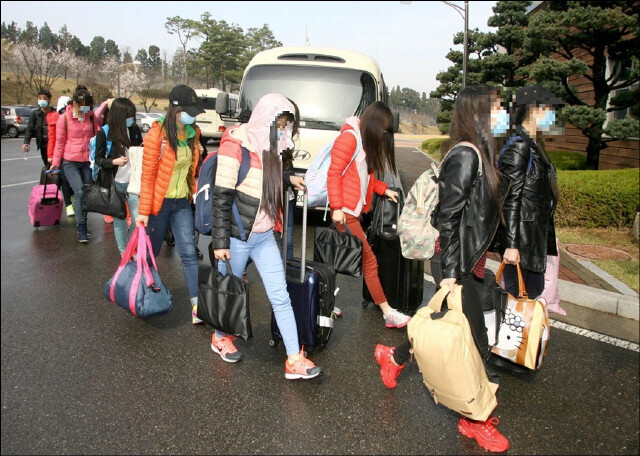hankyoreh
Links to other country sites 다른 나라 사이트 링크
13 North Korean restaurant staff released into South Korean society

The 13 North Koreans (one manager, 12 waitresses) who were part of a group defection in April from the Ryukyung Restaurant in Ningbo, China, were recently released from the Defector Protection Center (formerly the Joint Interrogation Center) following their interrogation by the National Intelligence Service (NIS), the Hankyoreh confirmed on Aug. 16.
Immediately after the 13 defectors entered South Korea on Apr. 7, the South Korean government made the unusual decision to publicly announce the group defection. There were suspicions that the announcement was the government’s attempt to rally support for the ruling Saenuri Party in the Apr. 13 general election. Even after their interrogation at the NIS’s Defector Protection Center, they were not sent to the Unification Ministry’s Settlement Support Center for North Korean Refugees, better known as Hanawon, as is normal protocol with defectors.
On Tuesday, a Unification Ministry official confirmed that “the defectors have been released into South Korean society” and said that they “do not wish for their identities to be revealed or to be interviewed.”
“Since there are a large number of defectors, they were not all released at once but were discharged from the center last week one at a time. They will not all live together, but they will live in places they have freely chosen,” another official said.
The defectors were released after being confined at the NIS’s Defector Protection Center for about four months. While the NIS and other government investigators can conduct joint interrogation of defectors at the center for a maximum of six months, this happens when defectors are strongly suspected of being spies in disguise. But since the government had already publicly announced that these 13 North Koreans were part of a group defection, there was no reason to carry out the joint investigation for so long.
The government also continued to keep the defectors from having any contact with the outside, leading to allegations that this was intended to prevent the spread of suspicions that Seoul had helped organize the defection.
The NIS refused on two occasions to even give the defectors a copy of the habeas corpus request form submitted by MINBYUN-Lawyers for a Democratic Society, and it also rejected a request for an interview by the Office of the United Nations High Commissioner for Human Rights (OHCHR), which had launched an investigation into the group defection.
By Kim Jin-cheol, staff reporter
Please direct questions or comments to [english@hani.co.kr]

Editorial・opinion
![[Column] Season 2 of special prosecutor probe may be coming to Korea soon [Column] Season 2 of special prosecutor probe may be coming to Korea soon](https://flexible.img.hani.co.kr/flexible/normal/500/300/imgdb/original/2024/0426/3317141030699447.jpg) [Column] Season 2 of special prosecutor probe may be coming to Korea soon
[Column] Season 2 of special prosecutor probe may be coming to Korea soon![[Column] Park Geun-hye déjà vu in Yoon Suk-yeol [Column] Park Geun-hye déjà vu in Yoon Suk-yeol](https://flexible.img.hani.co.kr/flexible/normal/500/300/imgdb/original/2024/0424/651713945113788.jpg) [Column] Park Geun-hye déjà vu in Yoon Suk-yeol
[Column] Park Geun-hye déjà vu in Yoon Suk-yeol- [Editorial] New weight of N. Korea’s nuclear threats makes dialogue all the more urgent
- [Guest essay] The real reason Korea’s new right wants to dub Rhee a founding father
- [Column] ‘Choson’: Is it time we start referring to N. Korea in its own terms?
- [Editorial] Japan’s rewriting of history with Korea has gone too far
- [Column] The president’s questionable capacity for dialogue
- [Column] Are chaebol firms just pizza pies for families to divvy up as they please?
- [Column] Has Korea, too, crossed the Rubicon on China?
- [Correspondent’s column] In Japan’s alliance with US, echoes of its past alliances with UK
Most viewed articles
- 1‘We must say no’: Seoul defense chief on Korean, USFK involvement in hypothetical Taiwan crisis
- 2After election rout, Yoon’s left with 3 choices for dealing with the opposition
- 3AI is catching up with humans at a ‘shocking’ rate
- 4Why Kim Jong-un is scrapping the term ‘Day of the Sun’ and toning down fanfare for predecessors
- 5[Editorial] Korea’s surprise Q1 growth requires objective assessment, not blind fanfare
- 6Noting shared ‘values,’ Korea hints at passport-free travel with Japan
- 7Two factors that’ll decide if Korea’s economy keeps on its upward trend
- 8Gangnam murderer says he killed “because women have always ignored me”
- 9The dream K-drama boyfriend stealing hearts and screens in Japan
- 10Yoon says collective action by doctors ‘shakes foundations of liberty and rule of law’